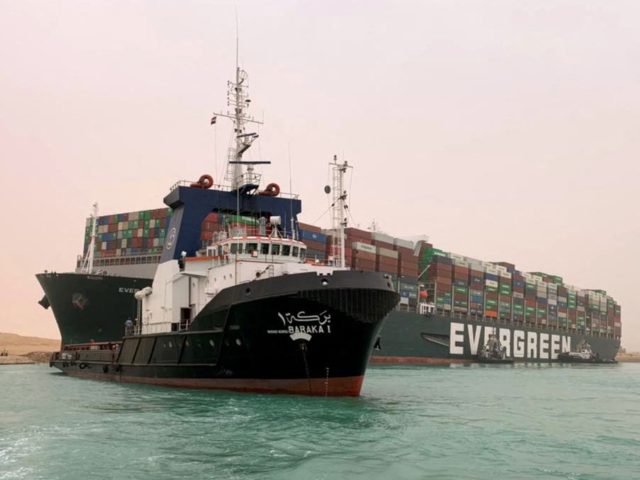President Joe Biden told reporters at his first presidential press conference on Thursday that he wanted to put “pipefitters and miners” to work capping unused oil and gas wells, rather than drilling new ones.
Meanwhile, on the other side of the world, the cargo ship Ever Given remained grounded in the Suez Canal, blocking the passage of hundreds of ships and disrupting the world’s supply chains — especially in the crucial oil and gas industry, for which the Suez is a significant conduit.
Over 4% of the world’s imported crude oil flows through the Suez Canal — from the Middle East and Asia to Europe and the West, and from the North Sea to China. Almost 9% of refined oil products are shipped through the canal.
Though pipelines have made the world’s energy industry less reliant on the canal, the effect of the blockage sent crude oil prices rising — until fears of a third wave of coronavirus lockdowns in Europe, and decreased demand for oil, sent prices downward again.
The crisis is a reminder of how important U.S. energy independence remains.
U.S. fossil fuel production rose under President Barack Obama — in spite of his policies discouraging it — because of the fracking boom on private land. With the backing of President Donald Trump, the domestic industry continued to grow, eventually making the U.S. the world’s number one oil producer. Meanwhile, U.S. carbon emissions dropped, thanks again to fracking, which provides clean-burning natural gas.
Energy independence used to be a bipartisan concern — especially after September 11, 2001, when Americans realized our dependence on oil in the Middle East had plunged us into sectarian and ethnic conflicts from which there was no easy escape.
It would be nice, theoretically, to achieve energy independence solely through renewable sources. That is not technically possible. For the foreseeable future, America’s energy needs will continue to rely significantly on fossil fuel resources.
President Biden once understood that. On the campaign trail in 2008, he promised West Virginia that he and Obama backed “clean coal.”
But in 2020, Biden ran on a specific promise to eliminate coal, oil, and fossil fuels over time. And on his first day in office, he canceled the permit for the Keystone XL pipeline. The following day, he suspended oil and gas permitting on federal land. These drastic measures killed tens of thousands of jobs, and suggested the fossil fuel industry was in danger.
There is no alternative. Renewable energy sources like solar and wind are not reliable enough, as recent blackouts in Texas and California both showed. And while nuclear energy could carry the burden, it faces staunch political opposition.
For the moment, fossil fuels are the best option for American energy and American jobs. And the blockage in the Suez Canal, which could take weeks to resolve, is a reminder of how dangerous it would be for the U.S. to let energy independence slip away.
Joel B. Pollak is Senior Editor-at-Large at Breitbart News and the host of Breitbart News Sunday on Sirius XM Patriot on Sunday evenings from 7 p.m. to 10 p.m. ET (4 p.m. to 7 p.m. PT). He is the author of the recent e-book is How Not to Be a Sh!thole Country: Lessons from South Africa. His recent book, RED NOVEMBER, tells the story of the 2020 Democratic presidential primary from a conservative perspective. He is a winner of the 2018 Robert Novak Journalism Alumni Fellowship. Follow him on Twitter at @joelpollak.

COMMENTS
Please let us know if you're having issues with commenting.